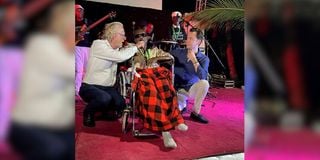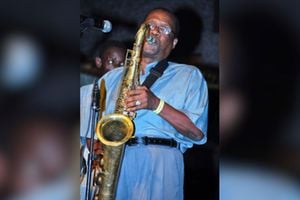
Teddy Kalanda with Severin Schulte (left) and Sebastian Severin at Teddy's last show at Severin Sea Lodge in Mombasa on December 15, 2022.
Sometimes a picture is worth a thousand words, and sometimes a phrase, say like “hakuna matata” captures a country, if not for the citizens, then at least for tourists who come to visit it, and experience the nation in its idealised form.
It is mid-December, 2022, and legendary musician Ted Kalanda Harrison has come from his home in Kaloleni to play his last ever show at the Severin Sea Lodge (SSL) – the Mombasa seaside resort that him and his brothers, iconic band ‘Them Mushrooms’ played in for six years between 1979 – 1985, in the course of which their most famous song ‘Hakuna Matata’ was written, with the world-famous phrase “Jambo Bwana” coined.
On this balmy and starry night, I, alongside dozens of dignitaries and friends of the Severin family, watch slightly moist-eyed as mzee Severin Schulte, in a white shirt, blue pants and gleaming leather shoes holds up the microphone to the mouth of Ted Kalanda – wearing shades, a yellow Afro-top, elbows cradled on wheelchair, Masai shuka over his lap to keep him warm, white socks, white teeth – opens his mouth wide to belt out their old hit “Jambo Bwana” in a voice that still is strong; as Sebastian Schulte Severin, who hadn’t been born when Them Mushrooms played at their hotel – silky blue shirt, cream pants, no socks, loafers – looks on mesmerized.
Teddy Kalanda Harrison is, of course, the legendary leader of one of Kenya’s most iconic bands, ‘Them Mushrooms’; he passed away almost a fortnight ago.
In the 1970s, Mombasa was the only act at the Coast – no Malindi and Watamu then giving it much competition as a tourist circuit, although the Italians still went north – but the Americans, British, Germans and Scandinavians mostly went to Mombasa – and since opening in 1972, 15 December, Severin Sea Lodge was (and still is) one of the most popular seaside resorts at the Coast.
It follows that these “wageni” wanted to listen to the hit songs from the West, like ABBA and Boney M, even when on holiday, and so the hotels complied, hiring Arab/Swahili musicians who played cover songs like Kelly Brown (Abdulkadhir Mohammed) from the Stevie Wonders and Elton Johns.
Ted Kalanda Harrison, as the head of ‘Them Mushrooms’ with brothers Billy Sarro, John Katana, Dennis Kalume and George Zirro, started out on home-made instruments as kids, as they and their two sisters were musical.
Ted Kalanda had great personal motivation to get ‘Them Mushrooms’ out of the ‘streets’ (in this case village ‘boma’ performances) and into serene seaside gigs.
Sometime in the late 1970s, after they had performed at a venue in Kilifi and not been paid, they had gotten into an altercation with the crooked ‘event’ organizer whose thugs then attacked the brothers, with one breaking Kalanda’s spectacles with the end result that a bit of glass blinded the eye, eventually (as one attacked a year ago by a roving, robbing gang at a charity slum slam by ‘Kosovo’ gang members, the merits of plastic lenses for safety cannot be over-emphasised).
Ted’s huge challenge was that their band’s musical equipment was that their hand-me-down musical instruments had now gone to rack, on their way to ruin. And since in life, first impressions are 80 per cent of the deal, hotel managers would take one look at Them Mushrooms ramshackle set, and not even let them through the door, let alone show them the door.
Ted has told the story of how they borrowed instruments from a band called ‘Mombasa Roots’ who then took them back once they realized Them Mushrooms were using them to grab gigs, leaving the brothers in a professional funk.
At the time, Ted and his brother Bill were working at Bamburi Cement and John at the KRA; moonlighting on music after long day jobs proved a ‘vampiric’ step too far for the brothers, and they eventually took that risky plunge.
And got into music full time after purchasing spanking new instruments from the iconic Assanands on Kimathi Street. Based in Tudor, Them Mushrooms had a mkokoteni, and eventually a second-hand Volkswagen van, to take their instruments from Tudor to Wherever.
Then the late Severin, founder of the sea lodge, and his son Schulte – who later founded the ‘Severin Tsavo’ luxury camp in the Tsavo – got them their lifechanging gig.
To play as the official SSL hotel band every evening except Monday nights.
It was at the Severin Sea Lodge that the band first played Ted Kalanda’s great composition “Hakuna Matata,” and Schulte immediately knew it would be a hit.
It was also at SSL that the foreign guests started calling out the “Jambo Bwana” greeting, from the catchword of the song, that is now the cheerful, cliché greeting that tells every Kenyan citizen that the greeter is a mzungu who hasn’t been long in Kenya.
Soon, all the other bands were doing seaside espionage to teach themselves to play ‘Hakuna Matata’ at their hotels, with “Jambo Bwana” the clarion call, first at the Coast, and then international, as the Giriama village band found themselves also in ‘majuu’ (overseas) places, with that one song as their magical ‘juju.’
Polygram had offices in Nairobi, back then, and one of its bosses on holiday at SSL heard the band play ‘Jambo Bwana’ and bid them come to Nairobi to cut the single. Once it hit the radio waves (of the VoK back then), the song went from Coastal, to national, and eventually regional phenomenon in a short time span.
It had become the ‘alternative national anthem,’ as radio executive Billy Odidi once put it, especially for wazungus; but also playfully embraced by Kenyans.
Buoyed by the success of the single, and at the invite of a German contact they had met and made at the Severin Sea Lodge, Ted and Them Mushrooms hopped on a plane to then West Germany in 1982, hoping to break into the Euro scene.
But even getting instruments to put on a bigger gig was hard, with Kalanda recalling how a local band there called Ashanti shafted them with instruments on a supposed Swiss gig that then fell through, as did an attempt to record “Jambo Bwana” with Polygram in Hamburg, Germany, who gave them a lot of humbug.
Meanwhile, having trusted ‘Boney M’ owner and producer Franz Farian with a recording of their hit song, the crafty German made his world-famous band do a remix called ‘No Problems’ (Hakuna Matata), having similarly ‘stolen’ Malaika from Fadhili Williams a couple of years later, with his record label Hansa hardly paying royalties to these talented Kenyans – the ‘Jambo’ in Boney M’s ‘Ten Thousand Light Years’ and Malaika in their ‘Boonoonoons’ album.
They returned to Kenya to continue on at the Severin Sea Lodge until 1985; then ‘vukad border’ once more to play in Tanzania, then tour the United Arab Emirates.
By 1989, ‘Them Mushrooms’ had introduced Coast Nite at the Carnivore, (where they had been the resident band since early 1987) – the ‘Voo’ had other popular nights like Ladies’ Night, Friday Funk and ‘Sunday Soul’ – and so successful did this ethnic cultural theme night prove that one of their, and Ted Kalanda’s, enduring legacies is this: From the lakeside to the sea, we still have Luo to Swahili nights, and everything in between (Kamba, Kikuyu, Kalenjin, Kisii, etc) where both the music, and cuisine, is from the region.
And then, of course, there is that one little song, the most famous ever from here:
“Jambo/ Jambo Bwana/ Habari yako? Mzuri Sana. Wageni, twa wakaribisha/ huku Kenya/ hakuna ma-ta-ta!” that made “Jambo Bwana” and “hakuna matata” as associated with Kenya as our runners and wildlife.
Oxford English Dictionary (OED), the world’s most authoritative dictionary, recently added “kitu kidogo” (small bribe/ inducement) and “panya route” (smuggler’s shortcut) to its official English parlance in the year 2024.
“All Oxford Languages content is uniquely curated and delivered by our expert team of lexicographers, linguists, and language technologists to the highest of standards,” said a source at Oxford University Press. “We bring this unparalleled expertise to partnerships across the globe as we work with like-minded innovators to advance learning and communication for future generations.”
Mochama is a top three finalist for the Jomo Kenyatta Prize for Literature, 2024. [email protected]








